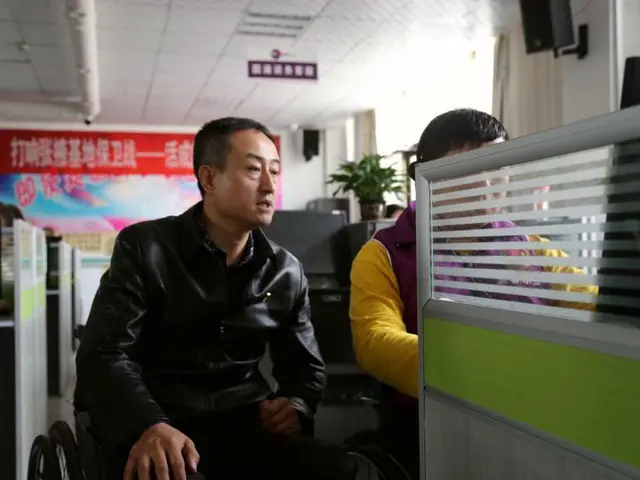Dozens of online customer service personnel filled a 100-square- meter room. The staff focused on their computer screens, talked into headsets and quickly typed away on their keyboards, a completely normal scene, except all the staff are in wheelchairs.
The staff, most of whom suffer from limb paralysis, work at an employment base affiliated with the China Foundation for Disabled Persons (CFDP) in Zhangye, northwest China's Gansu Province.
Liu Weiping, 48, who is in charge of the base, lost his legs in an accident 23 years ago. He was running a garment factory at the time.
Suicidal thoughts haunted him as his life seemed to be turned upside down. Fortunately, with encouragement from his family and friends, he gradually came to accept his life in a wheelchair.
Liu spent over 10 hours a day in rehabilitation training and sometimes returned to his factory to work. Despite his bruised body, he worked in bed and in his wheelchair.
Days were tough, but he never gave up. After closing his garment factory, he and his wife opened an auto service company and later an early-learning school.
Gradually, he came to realize that there were many others living in a wheelchair, just like him.
He wanted to make a difference, but he also knew that psychological care should come first. Through self-learning, he passed the tests and became a qualified psychological consultant and a family education instructor.
"Liu and other volunteers have provided free psychological counseling for thousands of disabled persons over the years and comforted hundreds of households with disabled members," said Jin Xiaorong, vice president of the Zhangye Disabled Persons' Federation.
In 2015, Liu opened an e-commerce company called "Wheelchair Legion" to create jobs for those in need. He became a "big brother" in the eyes of his "wheelchair bros."
In May 2017, Liu attended a training session in Beijing to learn how to tailor internet-related jobs to the disabled.
Not long after Liu was back, the CFDP landed the project of the Leye Employment Base. In November 2017, the CFDP entered a cooperation with YTO Express, a major courier service company in China. The Wheelchair Legion was entrusted to implement the project.
The CFDP provided facilities including computers and headsets. YTO Express was responsible for on-the-job training. Liu emptied his house as free office space and purchased tables and chairs using his own savings.
Liu's wife and even his mother, in her 70s, volunteered to prepare meals for the staff.
"Liu gave me a second life," said 27-year-old Tang Xiaopeng, who has been living in a wheelchair since childhood due to a congenital disease. For years he relied on his parents and government subsidies for a living.
Now as a member of the customer service staff, Tang has overcome the inconvenience brought by his knuckle deformity and is able to reply to customers rapidly by using keyboard shortcuts and reeling off answers on phone calls.
In August 2018, the staff moved into a new office. The local government invested over 1 million yuan (about 146,000 U.S. dollars) for office supplies and personnel training.
Tang's monthly pay also jumped to over 3,000 yuan from a meager 500 yuan in his first month on the job.
According to Jin, more than 50 disabled people and 10 non-disabled now have stable jobs on the base, with their salaries increased from less than 1,000 yuan, before coming to the base, to 6,675 yuan in December.
"Disabled people are entitled to a share of the economic and social development through the support of government and their own efforts," said Jin.
"What we need is not sympathy, but equal employment opportunities. We want to live in dignity, and we will," said Liu.
 简体中文
简体中文

